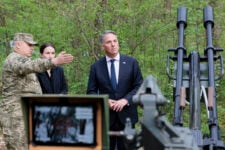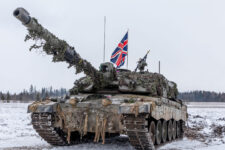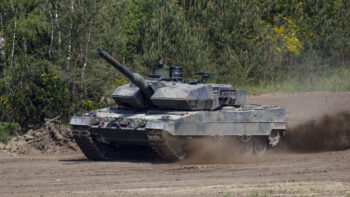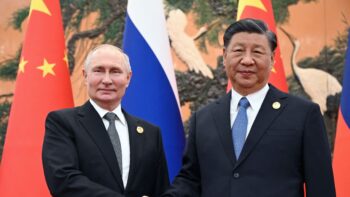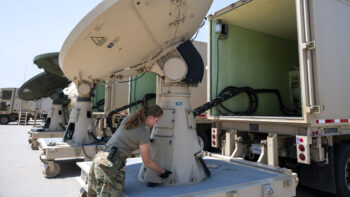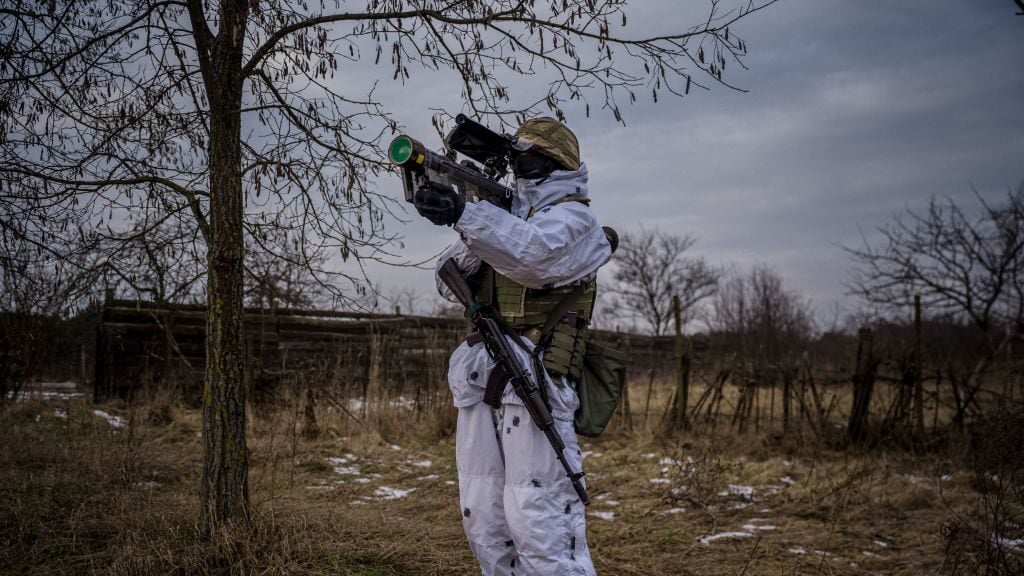
A Ukrainian serviceman aims a Stinger air-defense system (MANPADS) during a joint military training exercise near the border with Belarus. (Photo by DIMITAR DILKOFF/AFP via Getty Images)
BELFAST — In response to the failure of the US Congress to approve new military aid funding for Ukraine, a former Ukraine defense minister said that European nations in the US-led Ukraine Defense Contact Group have met to discuss whether to establish a new forum and exclude US participation.
Andriy Zagorodnyuk, chair of the Centre for Defence Strategies, a Ukrainian security think tank, said that US leadership had made a “historical strategic mistake” in not passing the delayed $105 billion supplemental funding bill that would commit new billions in defense spending to Ukraine and Israel.
“Right now, Europeans are talking about setting up new formats, saying that the United States cannot play that [leadership] role anymore simply because they already walked away from their support,” said Zagorodnyuk, during an Atlantic Council panel discussion on Monday. “I don’t know what the US is going to do about that, but that is what’s happening.”
Lloyd Austin, US Secretary of Defense, chairs the 54-nation Contact Group that typically meets on a monthly basis to renew military support for Ukraine through new weapons packages and multinational coalitions. The Pentagon and the Biden administration have lobbied hard for the supplemental, but it has crashed against partisan shoals in Congress. Speaker of the House Rep. Mike Johnson suggested on Sunday there could be movement with the aid package when lawmakers return from a recess.
Shortly after publication of this piece, reports emerged that NATO chief Jens Stoltenberg was circulating a plan that would move the Contact Group within the alliance itself, in order to protect it from being derailed by US politics.
With every day that passes, Ukraine faces an intensifying ammunition crisis, loses ground to Russia and continues to plead with equipment supply partners for additional air defense systems and long-range munitions. In perhaps a signal that the war would not end soon, Russian President Vladimir Putin signed a spring military conscription decree on Sunday that will see 150,000 new conscripts called up for frontline service.
That call, Zagorodnyuk said, represented a “strategic risk” for Ukrainian forces to consider “later this year.”
He stressed that at an operational level, Russia “is progressing a little bit right now based on the fact that we have a substantial imbalance over firepower.”
The gains by Moscow amount to “hundreds of metres … a couple of kilometres in some areas,” he added, but warned that “massive efforts” on the Russian side are being made to take advantage of Ukraine’s inferior ammunition firing rate.
So as American politicians bicker, some European officials have been increasingly vocal about the need to be less reliant on Washington, arguing that European security should be more robust.
In January, French President Emmanuel Macron said that “whatever America decides, we have to take the right and bold decisions to support Ukraine and the Ukrainian people.” He has since recommended European allies consider putting “boots on the ground” in Ukraine, though such a stance has not gained support outside Paris.
France has also been at pains to push back against claims that it has not done enough to support Ukraine as far as weapon supplies.
A flurry of new arms announcements and greater openness around spending has helped demonstrate in clearer terms Paris’s contributions to the Ukrainian cause. Figures from the French Armed Forces show that as of March 4, the total value of French military equipment delivered to Ukraine between February 2022 and the end of 2023 amounted to more than €3.8 billion ($4.1 billion), including €1.2 billion ($1.3 billion) in funding for the European Peace Facility. That program covers European Union “off budget” funding for defense-related assistance, including billions in aid to Kyiv.
Germany ranks as Europe’s largest donor of weapons to Ukraine. Berlin spent approximately €5 billion ($5.4 billion) on weapons supplies to Ukraine in 2023, following a total of €1.6 billion ($1.7 billion) in 2022, per official figures.
By comparison, between the start of the Ukraine war and March 12, the American DoD provided Ukraine with an estimated $44.2 billion in “military assistance,” according to figures from the US State Department.
The problems with the US supplemental “are the talk of Europe,” said John Herbst, senior director of the Atlantic Council’s Eurasia Center. “France…is now speaking about taking steps to support Ukraine including putting troops in Ukraine because it sees a vacuum. That is a vacuum wholly of our own making.”
He said the source of the supplemental delay was down to a “certain group of Republicans in the House of Representatives” but forecast that if House speaker Mike Johnson does not put the bill on the floor soon, bipartisan support for a discharge petition could unlock progress.
“There are enough Republicans and a whole lot of Democrats who will sign a discharge petition, and they’ve made clear their intention to do this,” he explained. “I think if we don’t see clear movement by the speaker in two or three weeks, we’re going to see the emergence of a discharge petition, around a [military aid] package, which will have enough votes.”
Updated 4/2/24 at 1:04 PM et with new information about NATO and the contact group.
Future European tank to be built by 4-party French and German industry venture
The future company will commit to a 50/50 workshare split between French and German manufacturers, supported by an “innovative ‘level-pillar approach,’” said manufacturer KNDS.


